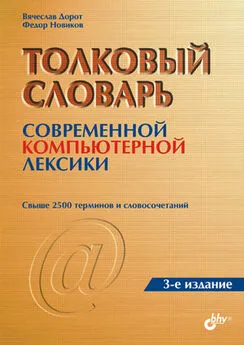Наталья Черниховская - Современная английская лексика для свободного общения
- Название:Современная английская лексика для свободного общения
- Автор:
- Жанр:
- Издательство:неизвестно
- Год:101
- ISBN:нет данных
- Рейтинг:
- Избранное:Добавить в избранное
-
Отзывы:
-
Ваша оценка:
Наталья Черниховская - Современная английская лексика для свободного общения краткое содержание
Современная английская лексика для свободного общения - читать онлайн бесплатно полную версию (весь текст целиком)
Интервал:
Закладка:
have a grudge
обижаться, точить зуб
• — Why do you have a grudge against your boss? / Чего ты злишь-
ся на своего босса?
— He gives me too much work. Sometimes I have to be in the
office on weekends. He promised me a raise for the past two
years. So far I’m still in the same place. If nothing changes in the near future, I quit. / Он дает мне слишком много работы.
Иногда мне приходится работать в выходные. Последние два
года он мне обещает повышение. Но я до сих пор на прежнем
месте. Если ничего не изменится, я уйду.
guess
угадывать, догадываться
• — What’s your name? / Как тебя зовут?
— Make a guess. / Отгадай.
guts
кишки (в буквальном и переносном смысле)
98
Современная английская лексика
(not to) have the guts
to do something
духу (не) хватает сделать что-либо
• — I don’t have the guts to say the truth. / У меня не хватает духа
сказать правду.
— I feel so sorry for you. You’re a weak man. / Мне тебя очень
жаль. Ты слабый человек.
Exercises
Заполните пропуски и найдите определение или синоним для
подчеркнутых фраз.
1.We’re running out of gas. We need to stop and get gas.
a) we’ve been running for too long; b) we have little gas left; c) we’re running to get gas
2.On her way home Laura dropped into the store to get some food.
a) only to find some food; b) to buy some food; c) to ask for some food 3.Can you say it again, please? I ... .
a) didn’t see you; b) didn’t get it; c) didn’t ask you
4.You got it all wrong! I never talked to Bill. I don’t even know him personally. You must have seen someone else with him.
a) You were jealous. b) You didn’t understand correctly. c) You saw me and Bill together.
5.I will get to travel for work quite often.
a) I will have to travel for work; b) I don’t like traveling for work; c) I might have to travel for work
6.It’s ... . Spring is coming.
a) getting warm; b) getting cold; c) getting better
G
99
7.I didn’t like the Chinese food in the first place. After a year in China I got to like it.
a) started to like; b) never really liked it; c) hoped that I would like it 8.My father and I don’t get along.
a) My father and I have very good relationship. b) My father and I don’t trust each other. c) The relationship between me and my father is not very good.
9.Summers are short in Russia. We don’t ... .
a) like them; b) get much sun; c) expect more
10.Sue and I agreed that we would meet at the train station. My train was late. Sue had gone by the time I got there.
a) by the time I arrived; b) by the time I left; c) by the time I got off the train
11.When we ... , it became easier for us to understand one another’s needs.
a) fell in love; b) fell out of love; c) got to know each other better 12.You should buy a ticket before you ... a train.
a) come in; b) get on; c) get in; d) go into
13.When you have a serious and straightforward conversation with someone, you say:
a) Let me get something straight. b) Let me introduce myself. c) Let me help you.
14.There is nothing we can do about it right now. We need to ... and hopefully things will get better.
a) forget about it; b) give it some time; c) start it over again 100
Современная английская лексика
15.— Can you give me a ride to my office?
— Not a problem.
a) take me there in your car; b) take me there by horse; c) walk with me to me office
16.Your friend wants to use your cell phone to make a call to his wife.
You say:
a) I’m sorry, it’s impossible. b) OK, I appreciate it. c) Go ahead.
17.I didn’t think it would work, but I went for it anyway.
a) tried it; b) went away; c) wanted to try
18.— Let’s ... tonight!
— OK! Where do you want to go?
a) stay in; b) go out; c) go to the movies; d) go back home
19.Two partners are trying to save their business. One of them say: We have to come up with something before we ... .
a) succeed; b) go under; c) win; d) lose
20.While Sam was on vacation, he was on the go all the time.
a) He was doing something all the time. b) He was traveling around every day. c) He wanted to do something but had to go.
21.It was a nice day. Jane and Jill decided ... .
a) to go for a drive; b) to stay in; c) to go shopping
22.If something goes wrong, it will be your responsibility, not mine.
a) happens the wrong way; b) travels in the wrong direction; c) comes out all wrong
23.— How are you doing?
— ... .
a) I’m well. b) I’m good. c) Yourself?
H
101
24.When you get an opportunity like this, you have to ... .
a) miss it; b) consider it; c) grab it
25.Marie has a grudge against Tom because he didn’t invite her to his birthday party.
a) was offended by Tom; b) is happy with Tom; c) is lucky to have Tom 26.George doesn’t have guts to say the truth.
a) doesn’t have courage; b) doesn’t have a stomach; c) doesn’t have a heart
H
kick a habit
бросить привычку, победить привычку
• Liz used to smoke twenty cigarettes a day, but she managed to kick that habit. / Лиз курила по двадцать сигарет в день, но суме-
ла избавиться от этой привычки.
hail a cab (taxi)
окликнуть, позвать такси
• — Can you get a cab for me, please? / Вы можете вызвать мне
такси?
— It will be more expensive for you to get a cab from the hotel. Just hail a taxi on the street. / Вызывать такси из отеля намного
дороже. Просто поймайте такси на улице.
102
Современная английская лексика
half bad
неплохой, неплохо
• — Did you get a chance to see my writing? / Тебе случайно не уда-
лось посмотреть мои статьи?
— Not really, because you sent a whole pack! But what I read wasn’t half bad. / Нет, потому что ты прислала целую кучу!
Но то, что я прочитал, было не так уж плохо.
halfway
наполовину
• — How’s work coming along? / Как продвигается работа?
— It’s about halfway done. / Она наполовину сделана.
• I asked for a coffee, and the bartender filled it only halfway. /
Я попросила кофе, а бармен наполнил кружку только наполовину.
hand
помощь
• I’m afraid I can’t do it myself. I need a hand with this. / Боюсь, я не
смогу сделать это сам. Мне нужна помощь.
give a hand
помочь
• — Can you give me a hand with this suitcase? / Ты можешь мне
помочь с этим чемоданом?
— Sure! / Конечно!
handle
иметь дело, справляться
• — This is my personal life. Let me handle it by myself. / Это моя
личная жизнь. Позволь мне самой с ней разобраться.
— OK, I’m not going to bring this up again. / Хорошо. Я больше не
буду об этом говорить.
H
103
handy
с золотыми руками
• My dad is a handy guy. He can fix anything. / У моего отца золо-
тые руки. Он может починить что угодно.
hang on
держаться (в буквальном и переносном смысле); ждать
• Hang on tight! We’re going to go fast now! / Держись крепче! Мы
сейчас поедем очень быстро!
hang out
тусоваться
• — What do you usually do when you go to Dubai? / Что ты обыч-
но делаешь, когда ездишь в Дубай?
— I hang out on the beach, do some shopping and get around town. /
Я тусуюсь на пляже, хожу по магазинам, гуляю по городу.
get the hang of something
научиться чему-либо, просечь фишку
• — I tried to learn to play guitar, but I just didn’t get the hang of it. /
Я пытался научиться играть на гитаре, но просто не мог про-
сечь фишку.
— You should have taken a few lessons. It’s very easy actually! /
Тебе надо было взять несколько уроков. На самом деле это
очень легко!
hang by a thread
висеть на волоске
• Tom and Nancy are fighting all the time. Their relationship is hanging by a thread. / Том и Нэнси все время ссорятся. Их отношения
висят на волоске.
104
Современная английская лексика
happen
случаться
• — What’s happened? / Что случилось?
— Nothing has happened. At least nothing that I know of. / Ничего
не случилось. По крайней мере, я ничего такого не знаю.
be hard on someone
Читать дальшеИнтервал:
Закладка:







